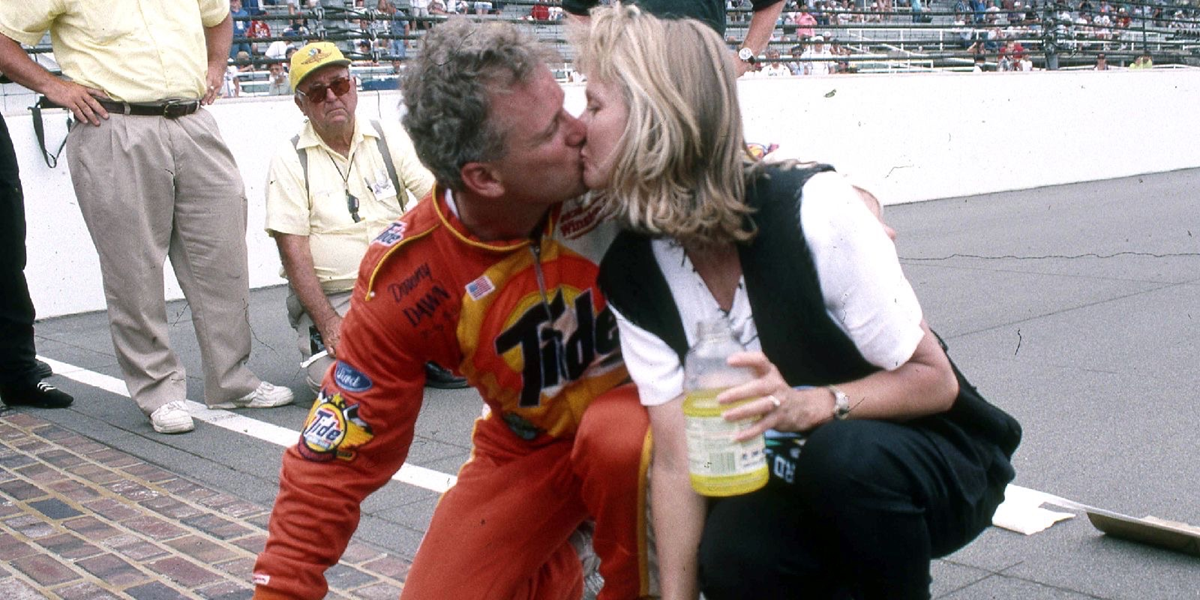
My Brickyard Moment: Ricky Rudd, 1997
June 08, 2020 | By Ricky Rudd
Note: This continues a series of letters from NASCAR drivers recounting their Big Machine Hand Sanitizer 400 Powered by Big Machine Records wins and other big moments to happen at the Brickyard. Read other installments of "My Brickyard Moment" here.
Ricky Rudd was his own man in 1997. Rudd owned the stock cars he raced and made financial ends meet with a frugal budget. While some of the teams he raced against that year employed more than 200 mechanics and engineers, Rudd got by with about two dozen worker bees, which each had a variety of job duties. When he got to Indianapolis Motor Speedway for the Brickyard 400, he was considered a long-shot contender for the victory. Using a combination of pit road smarts and fuel mileage strategy, Rudd scored the upset victory at Indy in his No. 10 Ford, a triumph that resonates to this day. Rudd retired as a NASCAR Cup Series driver in 2007. Here are his memories of that day, in his words:
Yes, I think it was an upset. If you look at it back during that day, then the multi-car teams were starting to have a lot of success. It all goes back to sponsorship dollars. You don’t know what the other teams have for a budget, but I can tell you we had a heck of a lot less than the competition around us at that particular time.
If you look at how many people we had working for us at the time, I would have to say that it was an upset from the fact the size of our team versus the size of the teams that we were able to beat that given day were truly lopsided.
I didn't really think much about it at the time. Don’t get me wrong. It was a big win. I didn’t think about it like “we whipped all these big guys today.” I looked at it as we did the job that our sponsors paid us to do. I guess there was a lot of pride involved.
Certainly there was a lot of pride knowing that deep down we accomplished some pretty big things that day. It wasn’t supposed to happen. I guess you sort of get cold to it and you move onto the next race and you don't really have a chance -- nobody has a chance to enjoy their victories -- because you move right onto the next stage, which might be a test the next day. You don’t have a chance to enjoy it too much.
But that particular day, of all the wins I’ve had over the years, I would say that I didn’t get caught up in the emotion from an owner’s standpoint. In other words, from an owner’s standpoint, it was a huge day. But I never really saw too much as that owner/driver. I saw myself more as a driver.
It was a big, huge day for me as a driver. I didn’t think of it in terms of a David and Goliath situation. I thought of it as, “Hey, I’m a driver that can win races, and I accomplished what I got paid to do that day.” A very neat win, there’s no question. The biggest win of my career.
I didn’t think about it as the little guy beating up on the big guys. I never really thought of it that way until probably after I retired.
I don’t remember the race lap by lap, but I definitely remember the highlights. Of the 900 or whatever races I ran, it’s the one I remember the best. We had a pretty good car, made a good qualifying run and started in the top 10.
I give the credit to my crew chief that year, Jim Long. He brought a lot of knowledge into our shop. I think he worked for Rick Hendrick before we got him. Jim had a record of doing well there. So I knew we would be competitive. Sure enough, we got there and were competitive off the truck. We ran good speeds. We qualified well.
A lot of people say we won it on fuel mileage, and that definitely played a factor. To me, we won with track position. We went to the pits on Lap 114 and never went back. I just stayed out to the end. A lot of teams had the fuel to go the distance, but a lot of teams chose to pit to get four new tires, and that moved us to the front.
We already knew because we had been buried in traffic that you had to have clean air. That’s kind of before the clean air concept got brewing really heavy, and it really showed up at Indy. The fast guys that were leading all day, now for the first time, they had to deal with the dirty air.
On the last restart, Bobby Labonte was on my back bumper. We had to hold him off the entire end of the run. If Bobby had been ahead of us on the racetrack, I don’t think we would have been able to pass him. That’s how important clean air was that day.
I think a lot of people tend to look at the 1997 Brickyard 400 and say “fuel mileage won you the race.” I say that fuel mileage put us in a position to capitalize and win the race, because we had a fast car all day.
I remember one more thing. I had never been one for the emotional thing, but it was kind of tough to hold back tears that day because I was thinking about what my dreams were when I was a little kid, how I wanted to win Indy one day. And there I was, in Victory Lane, at Indianapolis.